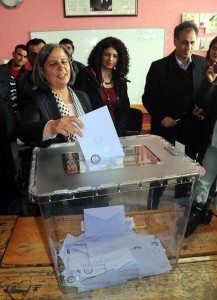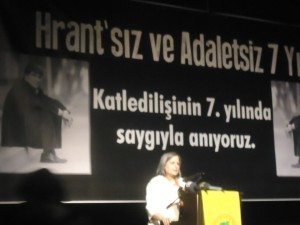Special for the Armenian Weekly
DIYARBAKIR, Turkey (A.W.)—Prime Minister Recep Tayyip Erdogan’s Justice and Development Party (AKP) has emerged as a clear winner in the local elections held in Turkey, as the pro-Kurdish Peace and Democracy Party (BDP) solidified its influence over the country’s southeast, wrestling several cities away from AKP.

In turn, the BDP added Bitlis, Ağrı, and Mardin to the list of metropolitan municipalities under its control, which include Van, Hakkari, Şırnak, Tunceli (Dersim), and Batman.
BDP also carried Iğdır, which it had won in the previous local elections (2009). Back then, Deputy Prime Minister Cemil Çiçek had said, “They took Iğdır too. They are now attached to Armenia,” referring to the pro-Kurdish party.
The BDP pioneered a system of local government with two co-mayors—a man and a woman—in every city where it ran. The first would be the mayor, while the second would head the municipal council. Under this system, 50 percent of the BDP’s mayoral candidates were women and, consequently, 50 percent of its municipal leaders are now women.
In Diyarbakır, a BDP stronghold, the party secured 56 percent of the vote, as its candidates for the metropolitan municipality as well as the Sur, Yenişehir, Kayapınar, and the Bağlar municipalities of Diyarbakır cruised to victory.
Gültan Kışanak, the co-chair of BDP, became the metropolitan mayor of Diyarbakır, replacing Osman Baydemir, who was, in turn, running for mayor in Urfa, but lost to the AKP candidate. The co-mayor with Kışanak will be Fırat Anlı.
Kışanak is one of the three women who are now heading metropolitan municipalities in Turkey. AKP’s Fatma Şahin (Gaziantep) and Republican People’s Party (CHP) candidate Özlem Çerçioğlu (Aydın) are the other two.
Metropolitan municipalities are provincial centers that have a population of 750,000 or above. They are, in turn, divided into second level municipalities.

Diyarbakir has four such municipalities, below are their mayors and co-mayors.
Sur Municipality: Seyit Narin (Narin replaces Abdullah Demirbaş), Fatma Şıkbarut
Yenişehir Municipality: Selim Kurbanoğlu, Ülkü Baytaş
Kayapınar Municipality: M. Ali Aydın, Fatma Arşimet
Bağlar Municipality: Birsen Kaya Akad, Eşref Yüksel
In neighboring Mardin, Ahmet Türk won the election. Februniye Akyol, an Assyrian, is the co-mayor.


Widespread power outages in major cities. Conflicting reports about who won in Ankara- with indications that AKP threw everything it had to rig the elections there, Yalova province being decided at 4 in the morning to have been one by a SINGLE vote to AKP. 8 people dead, many more injured. Turkish state agency- Anadolu Ajansi providing intentionally misleading results early on to discourage voters in Ankara, Istanbul and other battleground provinces. So a typical election in Turkey, all in all.
I hope the BDP/HDP can build on this election
The CHP party should have win. Power to the CHP party.
Thanks for the article and the comments. The creative election strategies (esp. dual mayors) of the Kurdish party are very interesting!
I view this as great news for Armenians and Armenia.
Here is why:
– This means the Islamist trend in Turkey is no fluke. It has solid and deep roots. As Murat YETKİN of HDN writes (March/31/2014): {“Here is the naked truth: Half of the corruption claims in any other democratic country would be enough to collapse the government; in Turkey it cost only a 5 point drop in support for Prime Minister Tayyip Erdoğan in the March 30 local elections”}. {“The majority of Turkish voters have closed their eyes and ears to the corruption claims, because Erdoğan told them to do so. He still has such an influence on them.”}. The Islamist trend in Turkey will solidify and gather strength in coming years.
– What was an aberration was Kemalism: Religion has very deep roots in any society; it was being artificially suppressed by Kemalists, with Western (Anglo-American) support and encouragement. Same thing happened in USSR: as soon as it broke up and Communist suppression of religion disappeared, Christianity and Islam sprang to life and re-bloomed in former Republics of USSR.
– The polarization in Turkey between Islamists and secular Kemalists will continue and get sharper: with a convincing win in the face of over-the-top corrupt practices and scandals, PM Erdogan will become even more intransigent and uncompromising.
– The polarization between AKP and Alevis will also grow sharper.
– Solid gains by Kurdish party BDP in the South East also indicate a steady trend towards autonomy** and eventual independence***.
– The cooling of relations and friction between Islamist Turkey and the West & NATO will continue. US will keep Turkey ‘friendly’, reluctantly, because of geopolitical calculus. But Erdogan will be suspicious of US and the West. No doubt Erdogan suspects, with good reason, that the Western intelligence services had a hand in the damaging leaks: AKP has been a thorn in the side of US (& Israel); a Western supported military coup is no longer feasible, so ‘they’ tried to damage AKP at the polls. It backfired. Erdogan has already vowed revenge.
– Cool relations and on/off friction with Israel will continue and might even get worse. The influential Jewish Diaspora will counter any hostility to Israel. The previous warm relations between secular Kemalist Turkey and Israel cannot possibly be revived.
This will be beginning of the breakup of the Ottoman Empire redux *.
I truly hope that the eventual dissolution of the current State of Turkey, a patchwork of disparate entities unnaturally held together by force, will be bloodless when it comes. Or at least with no blood of innocent bystanders shed.
Everybody, including current citizens and residents of Turkey, will be better off: Sunni Turkistan, Kurdistan, Shia/Alevi Turkistan, Otheristan.
Everybody lives happily ever after.
—–
*too bad for you Fascist, Neo-Nazi Christianaphobe Nationalist Turks: hardly any Christians left in Türkiye to blame for your coming disasters.
** [BDP promises Kurdish autonomy, wins three metropolitan municipalities] (TodaysZaman 31 March 2014, Monday /AZİZ İSTEGÜN, DİYARBAKIR)
{The Peace and Democracy Party (BDP), which emphasized its promise for autonomy for the Kurdish-populated regions of Turkey during its election campaign, won three metropolitan municipalities, eight provinces and 66 districts in Sunday’s local elections.}
Here is an interesting map of the election results:
http://www.hurriyetdailynews.com/election2014/election.html
***Kurds will not give up Western Armenia to Armenians for nothing. But I believe Armenians and Kurds can ‘trade’ and make a mutually beneficial deal. Even in the worst case, ‘no deal’, Kurdistan will act as a large break in the Pan-Turanic chain. Azerbaijan will be isolated. RoA & NKR near term strategic goal is to defang Azerbaijan and render it harmless. It will be a lot easier with Turkey not being able to help Turkbaijan.
Very good analysis. Thank you.
Isn’t this the same doomsday scenario after every election in Turkey? I’ve been hearing since 2002 that Erdogan is going to bring Sharia law to Turkey. Seems his priorities were more along the euros-in-shoe-boxes area. Yes, it’s a deeply polarized society, it’s been that way for decades. Conservative and nationalist politics have almost always ruled Turkey since 1950. The only difference was the conservatives before Erdogan (except Erbakan) respected secularism and had closer relations with the US (naturally, as most of this was during the Cold War). There’s been an Islamist trend for a while, but only now is Kemalism being challenged.
Alevis have always been marginalized, how much more polarized can that relationship get?
BDP have not made solid gains in the Southeast. In 2011 they got 6.57% of the vote. In 2009 they got 5.41%, and 5.2% in 2007. This time they got 4.6-5.0%, depending on your source. They carried more provinces but got less votes- whether that’s progress is debatable.
Will all this lead to the break up of Turkey? It’s not impossible that it would happen, but still very very unlikely. At most it would be the Kurds- but who’s going to do that? the PKK? What, with their leader in prison losing his mind? I don’t see why they’d want to leave Turkey anyways, as long the situation continues to improve and they are granted autonomy? Let’s not forget the southeast is the poorest region of Turkey. They leave- no more government benefits, no more free healthcare, no more migrating to the rich west coast cities to find jobs- their call if they want to form and live in a third world country (even if they have oil). Let’s also not forget that these are the people who murdered their neighbors in 1915 for personal gain- self preservation is important to them. They won’t go anywhere.